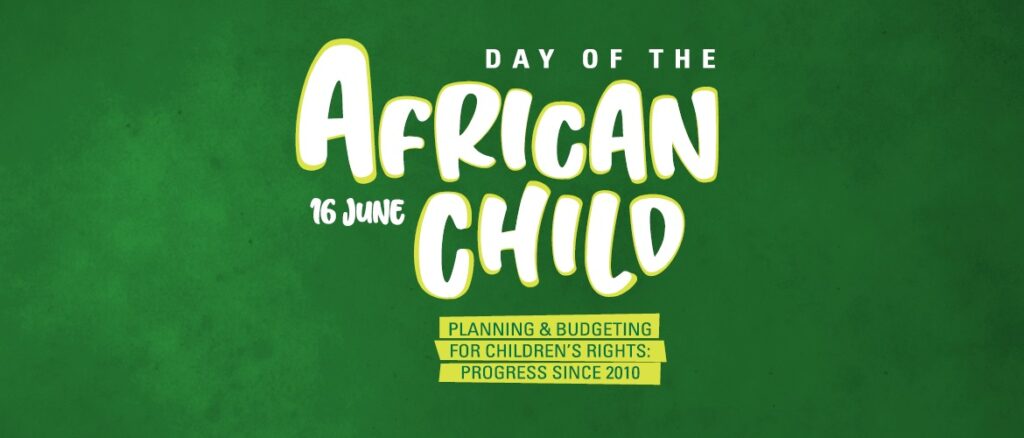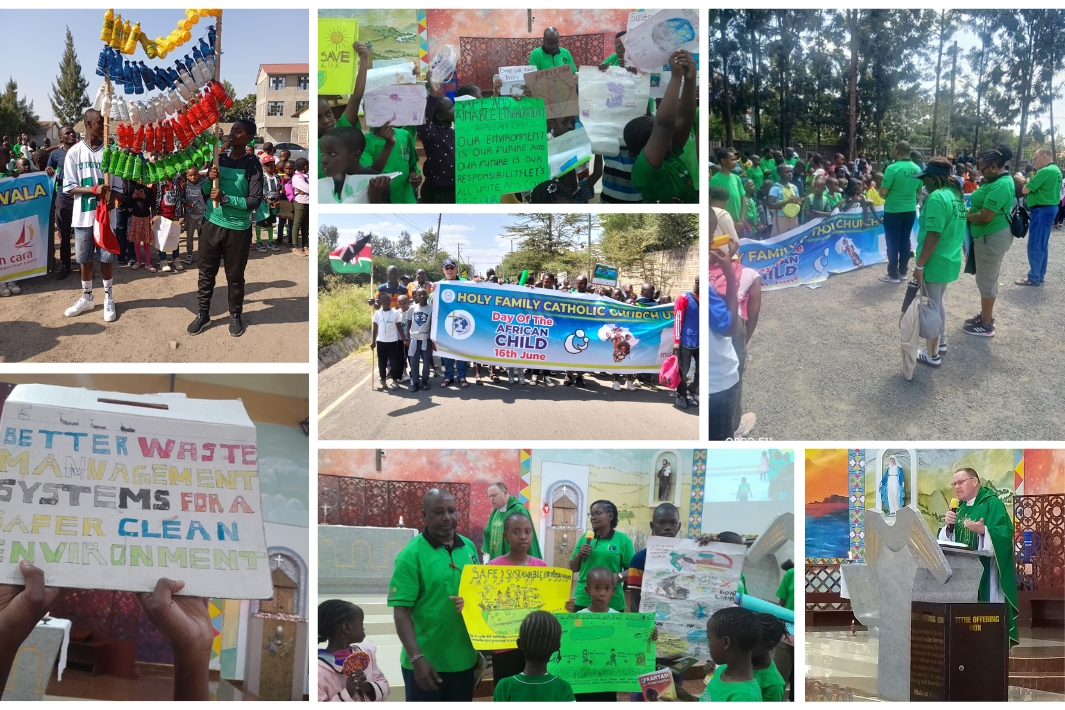CISA
UTAWALA, JUNE 21, 2025 (CISA)- In a moving show of faith, advocacy, and environmental awareness, Holy Family Catholic Parish Utawala, in partnership with its outstation St. Patrick’s Mavoko, commemorated the 2025 Day of the African Child (DAC) with a bold call to ecological justice and the safeguarding of children. The event, under the Archdiocese of Nairobi’s Eastern Deanery, embodied a shared commitment to protect both the en vironment and the dignity of the young.
vironment and the dignity of the young.
This year’s continental theme, “Planning and Budgeting for Children’s Rights,” found a striking local expression in the parish’s rallying slogan: “Safe and Sustainable Environment – ACT NOW!” The celebration focused keenly on environmental care, particularly on responsible plastic waste disposal, as a sacred duty owed to children and future generations.
A United Walk for Children and the Earth
The day’s activities began with synchronized environmental awareness walks held concurrently at Holy Family Catholic Parish Utawala and St. Patrick’s Mavoko Catholic Church . Fr Stanley Duru SPS, the Parish Priest and Fr Darmian Martel SPS, Assistant Parish Priest, flagged off the respective walks, each delivering deeply reflective messages grounded in ecological theology.
“Participation is paramount. We must rise as a faith community in defense of our children and the earth,” said Fr. Darmian, emphasizing the inseparable link between child protection, environmental sustainability, and active engagement in parish life.
Rooted in Church Teaching and African Wisdom
The celebrations drew deeply from the Catholic Social teaching and African spirituality. Drawing inspiration from Laudato Si’, Pope Francis’ encyclical on care for our common home, Fr Stanley reminded the faithful that ecological degradation is also a moral issue that affects safeguarding.
“As the Church, we must lead from the front in ensuring our children are not left behind in the global cry for ecological action,” he said.
He echoed the Pope’s probing question: “What kind of world do we want to leave to those who come after us, to children who are now growing up?”
Quoting from the Catechism of the Catholic Church and the AMECEA pastoral letter on ecology, speakers reinforced an enduring African perspective: “The earth is not inherited from our ancestors but borrowed from our children.”
The event also reflected on the work of African theologians such as the late Fr Dr Laurenti Magesa, who taught that care for creation is integral to upholding human dignity. Nicholas Okwatch, the parish safeguarding designate and representative of the Jesuit Center for Safeguarding at Hekima University (JCSA), cited St. Ignatius of Loyola to underscore the spiritual mandate to protect the most vulnerable, including earth itself.
“We remain committed to safeguarding in all its forms, and this ecological call is a vital part of that,” he stated.
A Broader Ecclesial Witness
The event was a manifestation of the Church’s broader response to climate change and child protection. Drawing from the Catechism, Laudato Si’, and African theological traditions, Holy Family Catholic Parish’s commemoration of DAC 2025 became a true response to Pope Francis’ appeal for integral ecology.
The Kenya Conference of Catholic Bishops (KCCB) reinforced this message in a recent pastoral letter, stating: “Caring for the environment is a moral obligation, especially where children’s health, development, and future are at stake. The Church in Kenya cannot remain silent while creation is abused and children are forced to grow up in polluted, unsafe environments.”
This sentiment echoes AMECEA’s stance that environmental degradation is not only an ecological but also a spiritual and cultural wound.
“The cry of the earth is the cry of the poor, and among the poorest are our children,” the bishops have declared. “Parishes must take the lead in modelling sustainable practices and safeguarding God’s creation.”
Archbishop Philip Anyolo of Nairobi has been vocal in encouraging this pastoral integration.
“Ecological justice is a child protection issue. Clean air, clean water, and safe spaces are rights every child deserves,” he said during a recent Safeguarding Conference. “We must not wait for others; the Church must lead now.”
He urged that catechesis, family ministry, and parish outreach programs include environmental stewardship, highlighting that children are both the Church’s present and future.
SPS Clergy: Ecological Justice Is Safeguarding
Prominent clergy from the Society of St. Patrick (SPS) – Kiltegans, also added depth to the event with bold theological reflections on ecology as a safeguarding imperative.
Fr Sean Barry SPS, Safeguarding Director, stated plainly: “Safeguarding is not confined to physical safety. It is spiritual, psychological, environmental. If a child grows up in toxic waste, in filth, and in pollution, then we have failed them long before abuse. Ecological degradation is a form of silent violence.”
Fr Dollan Dor SPS, an environmentalist and pastoral theologian, delivered a rousing call to action: “God did not create plastics, pollution, or poisoned rivers. These are our inventions, our sins. We must repent in action. Plant a tree. Recycle. Educate your child. Save the earth and you will have saved a soul.”
Fr Bosco Kamau SPS, Regional Superior, tied the issue to core Catholic beliefs: “The dignity of the human person is rooted in the image of God. When children are raised amidst garbage heaps and environmental neglect, their Imago Dei is disrespected. This is a grave injustice, and the Church must cry out against it.”
Children Lead the Charge
Young voices were not silent. Children from both outstations carried placards with messages they had crafted, advocating for clean environments and responsible living. Their artwork and messages won recognition and awards during the event.
“We must begin early to involve our children. They remain our greatest heritage from the Lord,” said Madam Violet Muyonga from the SPS Safeguarding Secretariat.
Fr Stanley emphasized that ecological justice should not be confined to annual events.
“It is a lifelong responsibility,” he said, urging families and Small Christian Communities to take the lead in local environmental initiatives. He also called on the parish’s Justice and Peace department to sustain ecological advocacy.
Eucharist, Reflection, and Renewed Commitment
The celebration culminated in a 10-kilometer walk followed by Holy Mass led by Fr Darmian. In his homily, he reflected on Jesus’ love for children, challenging the congregation to expand their understanding of protection to include ecological care.
“Jesus said, ‘Let the little children come to me.’ That includes giving them a world that is clean, green, and filled with dignity,” preached Fr Darmian.
The Day of the African Child (DAC) was launched by the Assembly of Heads of State of the Organization of African Unity (OAU) in 1991 to be commemorated on June 16 each year. The DAC pays tribute to the 1976 student uprising in Soweto, South Africa, which resulted in the killings of students who demonstrated against the poor quality of education they received and demanding to be taught in their own language by the apartheid regime.
Over the years, the Day has been an opportunity for all stakeholders and actors involved in the protection and promotion of children’s rights in Africa to come together, to consolidate common goals and to tackle the obstacles that stand in the way of achieving an Africa fit for its children.
